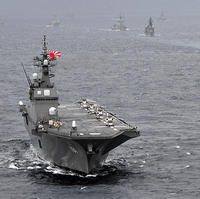Editor's note: This article is the second in a two-part series. Part I focused on the impact of budget cuts on the British navy. Part II focuses on the implications for U.S. national security policy.
As part of government-wide cuts meant to rein in decades of deficit spending, in October the U.K. Ministry of Defense announced an initial 8 percent reduction in its roughly $63 billion annual budget. The Royal Navy will suffer the deepest cuts, with around one-quarter of the fleet -- as measured by tonnage -- to be decommissioned and future purchases of ships and planes delayed and reduced.
As a result, the navy will be forced to give up some of its 11 current standing missions. The government has reiterated its commitment to an independent nuclear-deterrence patrol and to the defense of the Falklands Islands. With those missions "untouchable," it's likely that London will reduce its participation in multilateral naval missions such as the counterpiracy efforts being carried out by NATO, the EU, and the U.S. Navy off the Somalian coast, the U.S.-led Indian Ocean anti-smuggling task force, the coalition naval presence in the Persian Gulf and various humanitarian deployments such as that off of Haiti in early 2010.

